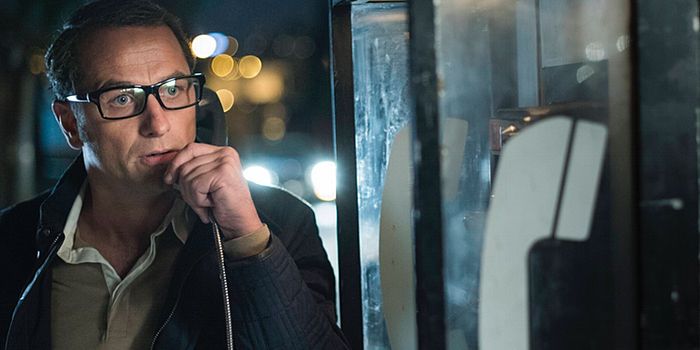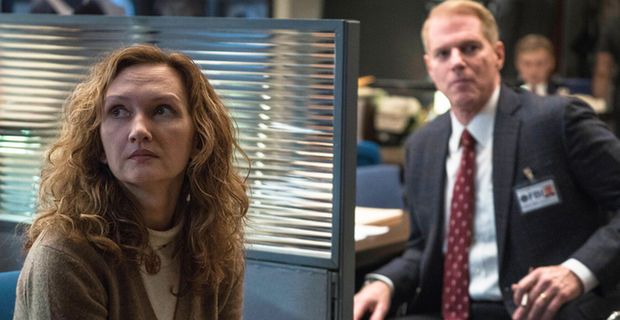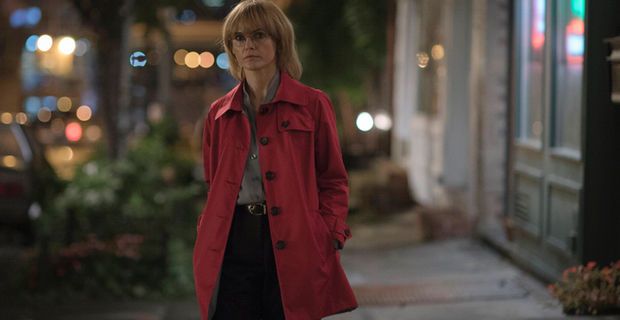[This is a review of The Americans season 3, episode 2. There will be SPOILERS.]
-
One of the fundamental challenges within the world of The Americans – and an aspect that makes it such a riveting story about the intricate and complex world of spies – is the way the series forces its main characters to continually compartmentalize facets of their lives to accommodate something grander. Or in this case, for the good of a country they can technically no longer call home.
As the central characters, Philip and Elizabeth Jennings are asked time and again to make the impossible happen, to make the demands of the Centre fit within a domestic situation that finds it increasingly difficult to accommodate such requests. And sometimes, the only way to accomplish the task before them is to force the issue until it, too, can be neatly compartmentalized into a particular worldview.
Consequently, the worldview of Philip and Elizabeth is a harsh one. It is one where the bones in Annelise’s limbs are snapped to fit her lifeless body into a suitcase, as the penalty for having dared to love a man and want to tell him the truth. It is a worldview where Nina, after having (possibly) loved Stan Beeman and Oleg Burov, is literally left with only a pot to…well, you know. It is a worldview where a Soviet defector like Zinaida Preobrazhenskaya is herself compartmentalized, shipped to the United States in a wooden crate, nursing an oxygen tank before taking a long drink of air on the other side of the Iron Curtain and learning about the magic of Milky Way bars. It is a world where things are packed up and shipped off, but rarely kept separate for too long.
As with any good spy story, the baggage in ‘Baggage’ isn’t merely the apparatus that takes the crumpled body of a woman who “was really something” out of a swanky hotel without drawing suspicion; it’s the intangible emotional element that stays with people like Philip and Elizabeth (and also Stan, Oleg, Nina…the list goes on) long after the deed is done.
But as the needs of their personal and professional lives dictate, that baggage must remain separate. That, in and of itself, is an act that carries its own assortment of dangers, as the emotions associated with it can manifest into something dark and deadly, like Oleg’s confrontation with Stan (not to mention the late fees that will undoubtedly accrue if he takes a bullet in that seedy-looking downtown D.C. alley). Or they can become awkward and painful, like Stan’s emotional pleas to reconnect with his ex-wife and off-screen son.
It's through moments like these that The Americans deepens and develops characters like Stan and Oleg. For as much as he might like to see Stan Beeman on his knees, Oleg proves himself to be more than an instrument of vengeance. As he demonstrates, not shooting a man is as decisive an action as pulling the trigger. And not shooting a man in the back is one that reveals his adherence to a heretofore-unknown code, one that, for all anyone knows, could be as much a surprise to Oleg as it was to those watching.
That's part of what makes The Americans so great: it tests its characters to see what they are capable of in the most difficult moments possible. Make no mistake, Oleg Burov is ruled by his heart, but there's more to him than blind passion turned to rage; he's also capable of not going through with an impetuous action, something Stan Beeman can't say is true about himself.
In his most difficult moments, Stan has frequently answered the call of temptation; he has proven himself incapable of keeping his emotions compartmentalized from the job that needed to be done. Those choices have resulted in the execution of Vlad, Nina being shipped off to a Russian labor camp, and Sandra shacking up with an EST man named Arthur.
The question now is: What will Stan do to define himself from the incredibly difficult situation he finds himself in?
But there is no more compartmentalized element on the show than Paige, and no bigger choice than the one that will determine her future. It's a decision that has her parents at odds, as their hopes for their daughter have veered off in wildly different directions. The thought of Paige ending up in a suitcase becomes Philip's argument against telling their daughter and getting her involved with their trade. But a hypothetical such as that isn't enough to sway Elizabeth, who is caught up in her own questions about motherhood and making the right choice. "We can't go back," she tells Philip when he suggests "they" owe her and that she travel back to Russia to see her mother again before she dies.
Elizabeth's words ring truer about what lies ahead than what lies in the past. No matter their decision, they've already reached a point they can't go back from. That point was arrived at when they entered the U.S.; it was arrived at when they had Paige. It was arrived at when Elizabeth tossed her daughter into the pool.
To Elizabeth, Paige's future feels more like an inevitable action than a conscious choice on her behalf. She can no more decide for the future of her child than the Soviet Union can decide the future of Afghanistan. Perhaps that's how her mother felt, too, and why she didn't hesitate when Elizabeth told her she'd been recruited.
As much as Philip may want to keep Paige separated and away from everything that could harm her, children have a way of turning that sentiment into independence. Before you know it, it's a new day and they're reading the newspaper in the kitchen.
The Americans continues next Wednesday with 'Open House' @10pm on FX.
Photos: Michael Parmelee/FX




